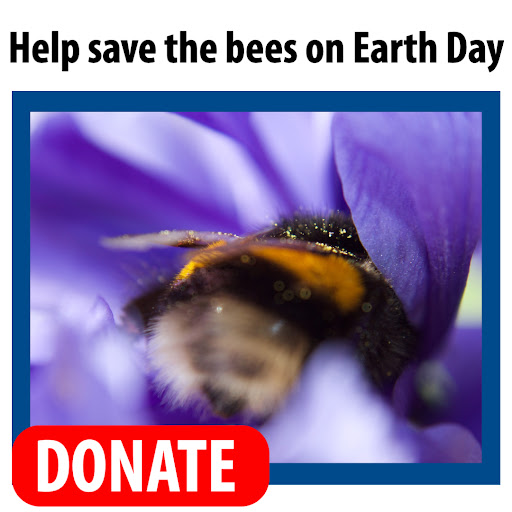

 |
John,
What would this Earth Day look like without bees?
Native bees pollinate 80% of all flowering plants on the planet, and without them, entire ecosystems could crumble.1 But it's no secret that threats to bees have grown steadily worse since the first Earth Day more than 50 years ago.
Bee populations are being devastated by a triple threat of climate change, habitat loss and toxic pesticides -- and we need to do what it takes to save them.
Right now, you can double your impact for the bees. Make your Earth Day gift before the deadline at midnight tonight to help save the bees. When you do, it will be MATCHED, up to $50,000 nationwide.
Without bold action to save the bees, future Earth Days will be more and more bleak. And many more bee species will be pushed to -- and over -- the brink of extinction.
We're not waiting to find out what this looks like. We have a plan to save the bees -- and with your support, we're putting it into action.
We're calling on companies including Amazon to stop selling the neonicotinoid pesticides that are killing bees. Home Depot and Lowe's have already made commitments -- now we're telling the world's largest online retailer to do the same.
We're working to convince the Biden administration to ban bee-killing pesticides in wildlife refuges. These are the places where bees should be safest of all -- and they will be, once we bring back the Obama-era ban on using neonics in these safe havens.
We're urging state leaders to protect pollinators. Seven states have already banned some of the worst uses of bee-killing pesticides, and we're working to add Colorado to that list. And we're urging our governor to call for the planting of more bee-friendly habitat in state parks and along roadsides.
But we can't make the world a safer place for bees without your support, John.
The threats facing bees are dire.
Neonicotinoid pesticides have made our environment 48 times more toxic to bees than it was just a few decades ago.2 The American bumblebee has declined by nearly 90% during that same time period -- and that's just one of the nearly 350 native bee species that are at increasing risk of extinction.3,4
The consequences of losing the bees are unthinkable, given the role they play in supporting our ecosystems and food production.
By eliminating the use of deadly pesticides that kill them, we can play a huge role in saving the bees. Make your Earth Day gift today.
Thank you,
Ellen Montgomery
1. "The Buzz on Native Bees," U.S. Geological Survey, June 15, 2015.
2. Stephen Leahy, "Insect 'apocalypse' in U.S. driven by 50x increase in toxic pesticides," National Geographic, August 6, 2019.
3. Elizabeth Gamillo, "The American Bumblebee Has Nearly Vanished From Eight States," Smithsonian Magazine, October 6, 2021.
4. Maryellen Kennedy Duckett, "Nature needs us to act--now," National Geographic, March 4, 2020.
Your donation will be used to support all of our campaigns to protect the environment, from saving the bees and protecting public lands, to standing up for clean water and fighting climate change. None of our work would be possible without supporters like you. Environment Colorado may transfer up to $50 per dues-paying member per year into the Environment Colorado Small Donor Committee.
Environment Colorado, Inc.
1543 Wazee St., Suite 400, Denver, CO 80202, (303) 573-3871
Member questions or requests call 1-800-401-6511.
Facebook | Twitter
If you want us to stop sending you e-mail then follow this link -- Unsubscribe